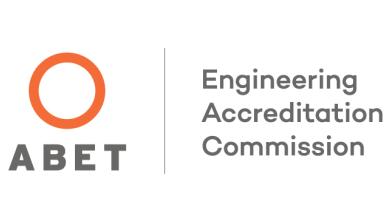ABET Accreditation
The University of Denver’s bachelor of science degrees in computer, electrical, and mechanical engineering are accredited by the Engineering Accreditation Commission of ABET, (abet.org). As one of the premiere ABET accredited engineering schools, the Ritchie School offers a hands-on, experiential learning and interdisciplinary collaboration environment.


Program Education Objectives
The program educational objectives (PEOs) of the BSCpE, BSEE, and BSME programs are to produce graduates who, within a few years of graduation, will:
- Apply their engineering and problem-solving skills towards engineering practice, engineering graduate school, or other fields such as medicine, science, business, or law.
- Value and demonstrate character by acting responsibly, ethically, and professionally.
- Work synergistically in diverse and global environments to positively impact society
- Embrace life-long learning to support professional development and personal wellness.

Student Outcomes
Student Outcome 1: an ability to identify, formulate, and solve complex engineering problems by applying principles of engineering, science, and mathematics
Student Outcome 2: an ability to apply engineering design to produce solutions that meet specified needs with consideration of public health, safety, and welfare, as well as global, cultural, social, environmental, and economic factors
Student Outcome 3: an ability to communicate effectively with a range of audiences
Student Outcome 4: an ability to recognize ethical and professional responsibilities in engineering situations and make informed judgments, which must consider the impact of engineering solutions in global, economic, environmental, and societal contexts
Student Outcome 5: an ability to function effectively on a team whose members together provide leadership, create a collaborative and inclusive environment, establish goals, plan tasks, and meet objectives
Student Outcome 6: an ability to develop and conduct appropriate experimentation, analyze and interpret data, and use engineering judgment to draw conclusions
Student Outcome 7: an ability to acquire and apply new knowledge as needed, using appropriate learning strategies.

Student Enrollment
| Fall 2017 | Fall 2018 | Fall 2019 | Fall 2020 | Fall 2021 | Fall 2022 | |
| Computer Engineering | 41 | 45 | 53 | 50 | 39 | 36 |
| Electrical Engineering | 50 | 52 | 48 | 53 | 42 | 39 |
| Mechanical Engineering | 173 | 183 | 159 | 153 | 138 | 137 |
| Undeclared - Engineering | 49 | 48 | 48 | 41 | 45 | 41 |
| Grand Total | 313 | 328 | 308 | 297 | 264 | 253 |
|
Fall 2017 |
Fall 2018 |
Fall 2019 |
Fall 2020 |
Fall 2021 |
Fall 2022 | |
|
Bioengineering |
8 | 6 | 7 | 5 | 6 | 8 |
|
Computer Engineering |
4 | 5 | 5 | 1 | 3 | 4 |
|
Electrical & Computer Engineering |
15 | 9 | 8 | 10 | 10 | 19 |
|
Electrical Engineering |
16 | 14 | 6 | 8 | 6 | 12 |
|
Engineering |
3 | 5 | 4 | 6 | 5 | 8 |
|
Engineering & Computer Science (Special) |
22 | 10 | 24 | 15 | 9 | 10 |
|
Materials Science |
7 | 4 | 6 | 6 | 2 | 2 |
|
Mechanical Engineering |
23 | 27 | 25 | 23 | 27 | 33 |
|
Mechatronic Systems Engineering |
26 | 32 | 25 | 18 | 8 | 7 |
|
Systems Engineering |
33 | 62 | 77 | 65 | ||
|
Grand Total |
124 | 112 | 143 | 154 | 153 | 168 |

Degrees Awarded
| Undergraduate Program | 2016-17 | 2017-18 | 2018-19 | 2019-20 | 2020-21 | 2021-2022 |
| BSCpE | 3 | 15 | 3 | 11 | 10 | 11 |
| BSEE | 8 | 15 | 13 | 5 | 20 | 10 |
| BSME | 29 | 38 | 38 | 40 | 31 | 33 |
|
Degree Type |
2016-17 |
2017-18 |
2018-19 |
2019-20 |
2020-2021 |
2021-2022 |
| Certificate | 0 | 0 | 0 | 0 | 27 | 36 |
| Bachelor's | 92 | 129 | 107 | 109 | 93 | 104 |
| Master's | 43 | 39 | 86 | 68 | 95 | 87 |
| Doctoral | 7 | 14 | 14 | 18 | 11 | 7 |
| Grand Total | 142 | 182 | 207 | 195 | 226 | 234 |
Learn more
For full curriculum and graduation requirements, please visit:
Undergraduate Bulletin Graduate Bulletin


